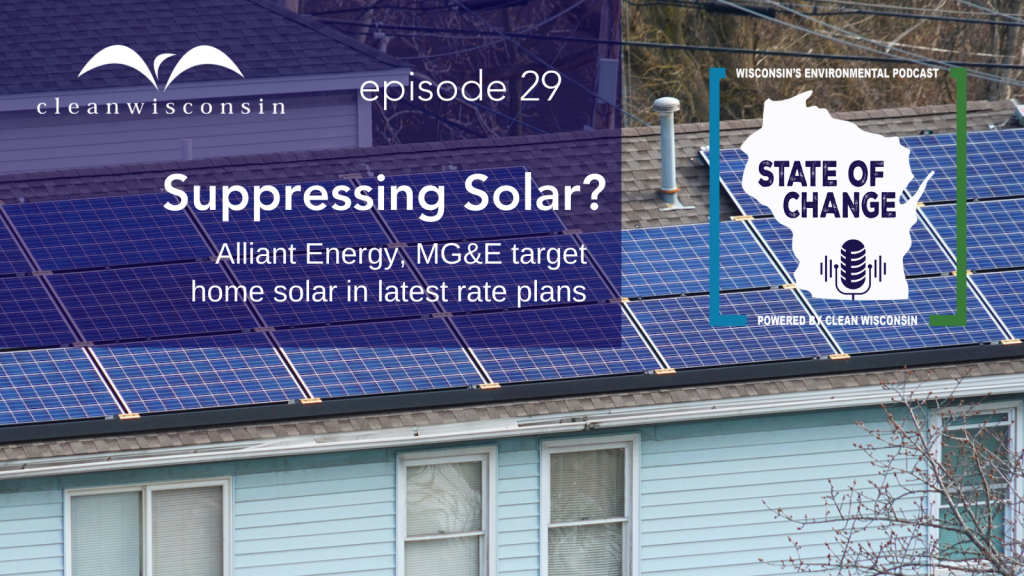It feels like momentum is growing behind rooftop solar in Wisconsin. Federal tax incentives from the Inflation Reduction Act, Focus on Energy rebates, and falling prices could finally push us out of the bottom half of states when it comes to home solar. Except some power utilities in Wisconsin appear to be pushing back.
In this episode, a look plans from MG&E and Alliant Energy that could slow adoption of rooftop solar in Wisconsin. Find out what you can do to protect solar in your community.
Host:
Amy Barrilleaux
Guests:
Chelsea Chandler, Clean Wisconsin Climate, Energy & Air Program Director
Ciaran Gallagher, Clean Wisconsin Energy & Air Manager
Background Reading:
Take Action: Tell the PSC to Protect Rooftop Solar
Wisconsin’s Roadmap to Net Zero by 2050
Three big things: Transitioning to Clean Energy in Wisconsin
Where to Listen:
Full Transcript:
Amy Barrilleaux: Net metering. It doesn’t sound that exciting, but it’s actually one of the biggest incentives for families and small businesses to go solar. When your rooftop panels produce more energy than you can use, that energy goes into the grid, and your utility credits you for it. Now, MG&E and Alliant Energy are taking aim at that net metering incentive. Both are seeking approval from the Public Service Commission to drastically change the way they treat customers who install solar panels.
MG&E wants to offer a modest upfront payment when a rooftop system goes online, then substantially cut what they pay families for energy generated after that to a low wholesale rate. Meantime, Alliant is trying to move to a complex system of charges, credits and changing rates that would even charge people for some of the energy they provide to the grid. Clean energy advocates across the state are coming out strong against both proposals, saying the plans are going to make it even harder for families to recover the cost of installing solar. Joining me are clean Wisconsin Climate Energy and Air program director Chelsea Chandler and Energy and Air manager Ciaran Gallagher. Thank you both so much for taking the time to talk through all this.
Chelsea Chandler: Tanks for having us.
Ciaran Gallagher: It’s a pleasure.
Amy: Are you surprised that this is happening, that we have two utilities right now targeting the way they they pay homeowners for this energy?
Chelsea: You know, it is a little surprising and concerning that a couple of utilities that have carbon-free electricity goals would take a position that is making it harder for their customers to go solar and contribute to a clean energy grid. So unfortunately, this is a move that is kind of running counter to some of those shared goals that we have.
Amy: When you think about solar energy, rooftop solar isn’t the big energy producer, I mean, compared to a solar farm or wind farm. So Ciaran, why is it important that we have more rooftop solar in Wisconsin?
Ciaran: In order to achieve our clean energy goals, we’re going to need large scale solar and large scale wind transmission lines and also these small distributed energies. Microgrids, rooftop solar, geothermal, all of those can decrease the demand of electricity, especially during the summer peak, and reduce the burden on the electricity grid. You’re right that right now, rooftop solar does not generate much in-state electricity. It’s actually only about 0.3% of electricity that we produce in in Wisconsin is from rooftop solar. And I think that speaks to what Chelsea said earlier, that it’s surprising that net metering is being attacked right now because there’s so much potential in Wisconsin for rooftop solar. We are nowhere near the amount of energy we could produce on our homes and businesses. And net metering is a policy mechanism that is one of the most influential for homeowners and small businesses to decide whether or not to get rooftop solar.
Chelsea: Can I just add, I totally agree with all of that. And I would also say that it’s an energy independence argument. It’s a way for people to self generate and to produce their own electricity in a clean and sustainable and more affordable manner. You know, if they want to be able to save on their energy bills by producing their own clean energy at home, that should really be their their right.
Amy: So you’ve said in the past there’s no silver bullet when it comes to creating clean energy. We can’t just have rooftop solar. We can’t just have wind or solar farms. We kind of need this mix. Are you concerned that these pushes by Alliant Energy and MG&E–and maybe are some other utilities out there thinking about this–are going to, you know, push us backward, I guess, in terms of what we need to be doing?
Chelsea: Yeah, I think that just we’re going to be stronger overall by having many different sources of electricity and we don’t want to put all of our eggs in one basket. Like you said, there’s no silver bullet. We need silver buckshot. And we really do need kind of an all of the above approach. We need to be smart about it, but we shouldn’t be stifling important energy resources where there is potential for for growth. And that’s why it’s problematic. As Ciaran said, you know, it’s a pretty low amount of our total electricity production in Wisconsin right now. But that’s also kind of the point. There’s a lot of room to grow. You know, where we’re seeing more of this pushback in places like California. We’re nowhere near where California is in terms of our solar rooftop penetration. And part of that is because there are all kinds of incentives for them to go solar. In Wisconsin, we have plenty of sun availability. We have good conditions. There are many cities and countries around the world that have similar climates. This is a good place for solar too. And we need to be kind of pushing everywhere to get where we need to go, because as our Net Zero Roadmap showed us, there are clear pathways to get there, but they’re going to take more effort than we’re putting in right now. You know, we need to accelerate the pace, not slow it down. So any effort that is stifling what could contribute to meaningful additions to our clean energy system that is going to help us replace our dirty, you know, fossil grid that we are dependent on right now. That’s largely coal and gas. We need to be pushing in the right direction, not hitting the brakes.
Amy: How frustrating is it when you have utilities like MG&E, like Alliant Energy that say, you know, “Yes, we share your goals. We want a clean energy future, too,” and then to have those utilities come out with plans that, in your opinion, are pushing us further from that goal? Or to have some utilities maybe like We Energies with its coal plant, say, “Oh, well, we might need to push back the closure date of that coal plant.” When you see utilities in Wisconsin taking steps that feel like they’re just pushing us further from where we need to be.
Ciaran: It is incredibly frustrating and I think is a indication of why we need strong state regulators and state and federal laws to ensure that coal plants are closed as soon as possible, to ensure this acceleration of clean energy and the energy independence that you can get from generating your own electricity on your roof.
Amy: With these plans, there’s a lot of concern about the complexity and maybe the lack of long term stability when it comes to buy back rates. Why are those things such a big deal?
Chelsea: Right. Yeah. So families and businesses are, you know, when they’re planning to put in a solar array, they are planning for the future. They’re looking at what their payback period is going to be, you know, how affordable the system is going to be, what size they want to be. And there are a lot of factors that are going to play into their decision making. Having a complicated structure for how they are going to be charged for excess electricity or getting, you know, money for the excess electricity that they put back onto the grid, makes it really hard for them to make some of those investment decisions because it’s just really complicated and it’s kind of unclear how much money they’re going to be able to get back, how quickly they’re going to be able to recoup their investment. So moving from what is a, you know, very kind of stable and clear structure that they have now to one that is much more complex and also kind of uncertain in its sustainability. There’s, in the Alliant case, four different fees, basically. And so you change any one of those and it changes the math, what you’re paying or what you’re getting back. We don’t know how long in the MG&E case, for example, current customers will get grandfathered in where they are not subject to this new scheme. So we just want to make sure that there is not kind of a bait and switch of, you know, looking like it might be kind of okay, even though it’s this new system, because the math kind of works out because we don’t know kind of what the math is going to look like in coming years and what kind of changes might be made down the line.
Amy: Why would utilities be opposed to doing everything they can to help homeowners and small businesses have rooftop solar?
Chelsea: Well, I mean, their business model is building infrastructure and selling electricity to customers. So I think part of it is kind of ownership and just business kind of financial incentives. Our investor-owned utilities earn very high return on their investments, especially infrastructure. But, you know, I think that having that control of how energy is being generated and flowing serves their business and financial interests.
Ciaran: t’s similar to their opposition to third party financing and community solar in that they want to be able to own and receive a return on the infrastructure. And it is in line with some of the the opposition that they’ve had it for other state state laws and policies that would increase the ownership and and independence of electricity generation.
Amy: So, I mean, what does it feel like to be somebody who advocates for clean energy day in and day out to see these utilities that are basically, you know, in the power position in terms of clean energy and how we’re going to move forward, work to stymie some of these things — to maybe not encourage rooftop solar, to try to push back, some utilities in the state, against people being able to finance through a third party putting solar on their houses. Does it feel like it’s almost impossible to get to get buy-in or to get utilities to kind of change their way of thinking?
Chelsea: Look, you know, financial incentives are really powerful. And so a lot of it is just kind of the business model that we we have. And that is always going be a challenge, whether it’s, you know, utilities or any other industry, they’re going to kind of look out for their bottom line. I appreciate that our investor-owned utilities in Wisconsin all have carbon-free electricity goals. I think there’s a question of how we get to those goals, the pace at which we get to those goals. There’s clear evidence that, you know, it’s not fast enough right now. Climate change is not a future problem. You know, it’s it’s here. I’ve never seen more headlines on the news than really this summer or even recently the last few years. It’s resonating and hitting people in a very real way from, you know, all the wildfire smoke we’ve experienced this summer, all the DNR air quality alerts. It’s it’s alarming and it’s affecting us here in Wisconsin. So it is disappointing when we are seeing resistance from folks that we really need as as partners in this. So I’m glad we’re working towards the same goals. I think we need to work towards them faster and in a way that is giving people more choices in their energy system, that’s allowing them to also be, you know, heroes. And part of the solution is we don’t want to vilify people that are putting solar panels on their home. They’re champions. They’re heroes. They’re helping with this transition to a clean energy future. And we need to just be catalyzing those efforts instead of dampening them. And again, it really is an all of the above approach. I have a six kilowatt solar array on the barn at my farm, and I’m also supporting these large scale projects because I know that we need both or we’re not going to avert the worst consequences of the climate crisis. And that’s just a fact.
Amy: So it feels a little hopeless because I think, you know, utilities like MG&E and Alliant are pretty powerful. They have a case before the PSC, and sometimes it can be hard to feel like we can do anything about that. But what can people do right now to try to maybe get MG&E and alliance to think about rooftop solar differently or maybe to influence the PSC decision on this?
Chelsea: Well, there are public hearings and open comment periods for both the MG&E and Alliant rare cases. So one clear opportunity is to either submit a comment, you know, written online or you can show up in person at the hearing and let the PSC know how you feel about these proposals to drastically change the net metering policies. You can also reach out to your utility directly and let them know how you feel about how they’re changing and disincentivizing solar energy production by their customers. You know, you are one of their customers and you it’s within your your rights. And you know, it’s a way that you can speak up on the issues to let them know how you feel about it. Because I think that they do care about what their customers think. When you’re working on climate issues, it’s never it’s never hopeless. I know that we’re up against a lot of challenging circumstances and a lot of powerful players, but we can definitely keep things from getting worse and we can work together to try and build a healthier future for all of us. So, you know, use your voice that that is a big, powerful way that you can exert some influence.
Amy: Chelsea Chandler and Ciaran Gallagher, my very knowledgeable colleagues, thank you both so much for joining me on the podcast today. [00:15:39][6.4]
Chelsea: Thank you.
Ciaran: Thank you.






